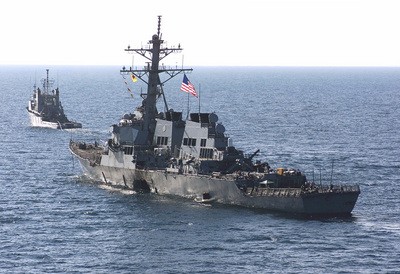Saudi Man Arraigned in Deadly USS Cole Bombing
GUANTANAMO BAY NAVAL BASE, Cuba—A Saudi considered among the most senior figures in al Qaeda emerged Wednesday from nine years of secret confinement to face charges of orchestrating the deadly...

By Jess Bravin, The Wall Street Journal
FORT MEADE, Md. — The man accused of planning the October 2000 attack on the USS Cole was arraigned Wednesday by a military commission in Guantanamo Bay, Cuba, but won a victory when a military judge ordered prison officials to stop reading his legal mail.
Abd al-Rahim al-Nashiri, who deferred entering a plea, faces capital charges for his alleged role in several attacks, including the suicide bombing of the USS Cole, which killed 17 sailors when terrorists crashed a small boat into the warship in Yemen.
Wednesday’s four-hour proceeding ushered in the first major prosecution under the 2009 Military Commissions Act signed by President Barack Obama. Mr. Obama had criticized the system conceived by the Bush administration and pledged to make it fairer and less secretive.
The chief prosecutor, Brig. Gen. Mark Martins, said the proceedings would meet “the highest standards of our ancient adversarial and public” justice system. Mr. Nashiri’s chief defense lawyer, Richard Kammen, a civilian death-penalty specialist, said that while the day went “probably as smoothly as it could have gone, a lot of the problems with this process are beginning to crystallize.”
For the first time, the public was permitted to observe proceedings from the continental U.S., through a closed-circuit feed to Fort Meade, outside Washington. A last-minute order by the military judge, Col. James Pohl, expanded access to anyone who showed up at the base.
The Saudi-born Mr. Nashiri spent years in the secret prisons of the Central Intelligence Agency after his 2002 capture, where he was one of three detainees the government acknowledges were waterboarded during a harsh interrogation regime defense attorneys describe as torture. Mr. Nashiri’s attorneys indicated that their strategy could focus on his treatment. Col. Pohl said that if Mr. Nashiri is convicted, defense lawyers could argue that government misconduct should weigh against imposing a death sentence.
The Convention Against Torture requires authorities who receive credible evidence of torture to refer the alleged torturers for possible prosecution. Mr. Kammen asked if Col. Pohl would refer even “high officials,” if such evidence were introduced. Col. Pohl said that while he wouldn’t offer an “advisory opinion,” he would, in all matters, “comply with the requirements of the law.”
More immediately, defense attorneys scored a victory when Col. Pohl, over vigorous government objection, ordered prison officials to stop reading confidential mail between the defendant and his lawyers. The military judge discounted assertions by the deputy trial prosecutor, Cmdr. Andrea Lockhart, that “national security” and “force protection” required such measures, noting that they had been imposed only a month ago.
Mr. Nashiri, 46 years old, seemed upbeat and occasionally bemused during the hearing, usually speaking through an Arabic interpreter but occasionally offering a few words in English.
The government arranged for survivors of the Cole attack and relatives of its victims to witness the proceedings.
“I always thought it would be very upsetting to me,” said John Clodfelter, whose son, Kenneth Clodfelter, was a sailor killed in the bombing. “But when we first saw him coming into the courtroom, he was just a pitiful-looking person.”
(c) 2011 Dow Jones & Company, Inc.

Sign up for gCaptain’s newsletter and never miss an update

Subscribe to gCaptain Daily and stay informed with the latest global maritime and offshore news
Essential news coupled with the finest maritime content sourced from across the globe.
Sign Up